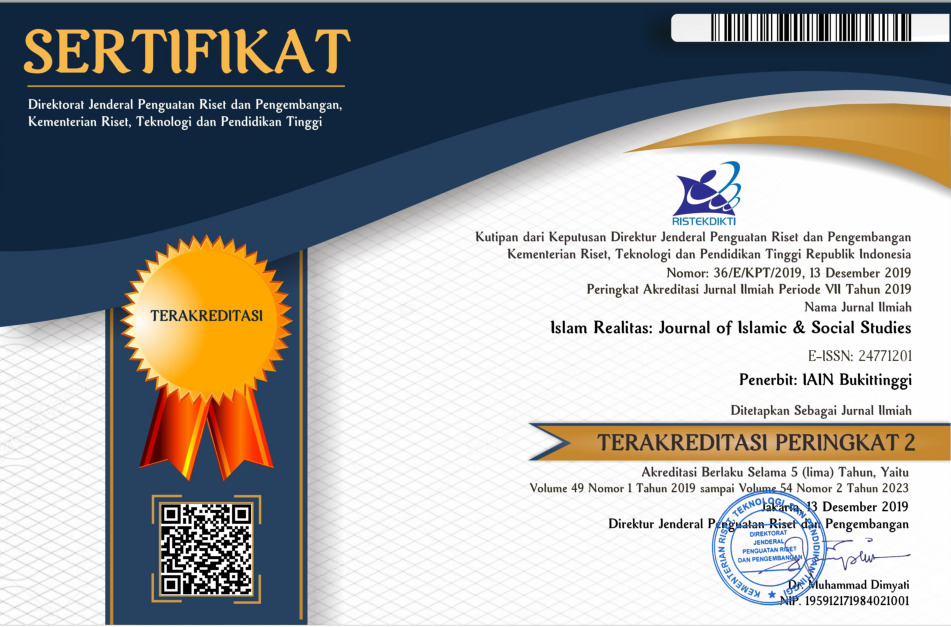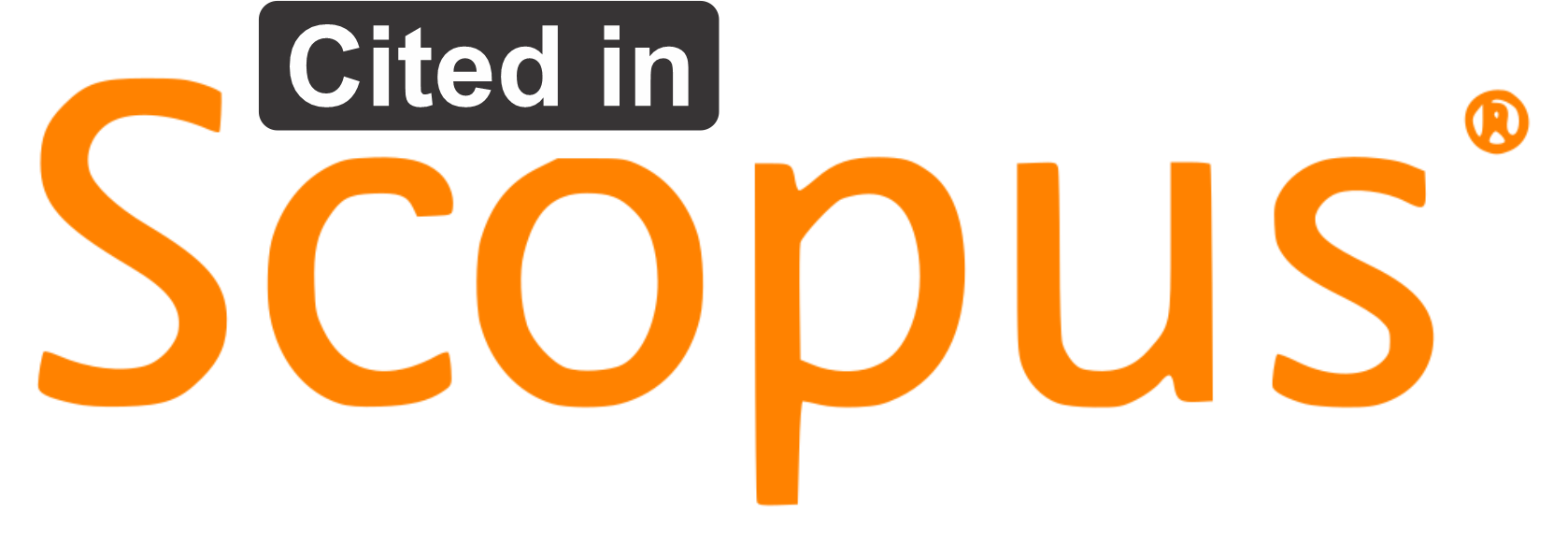The Young Kyai (Lora) and Transformation of the Pesantren in Madura
Downloads
Additional Files
This research focuses on the leadership of the A’wam Council, group of young religious scholars or kyai (Lora) at the Mambaul Ulum Bata-Bata Pamekasan Madura Islamic Boarding School, in carrying out institutional transformation of the pesantren (traditional Islamic boarding schools). As the protector of religious-culture, Lora not only preserves the various acpects of religion such as marriage and security (by performing the rituals of tahlil, or yasinan) but also maintains public morality and good social and political relations in the community. Lora functions as the a protector of culture and religion (amanah or public trust) in order to increase the social capital of the pesantren (enriching social networks). Using the collective leadership theory by O’Neill & Berinkerhoff and a qualitative approach through observation, interviews, and documentation, this article finds that Lora leadership made use of Islamic values in transforming this institution from a traditional pesantren (salaf) to modern one (khalaf). This process was coupled with the development of an interconnective-integralist paradigm that led to a new pesantren model that not only preserves the traditional methods but also adopted new developments in contemporary thought, namely combining and integrating religious knowledge with general science
Â
Riset ini memfokuskan pada dinamika kepemimpinan Dewan A’wam –yang merupakan kumpulan kyai muda (Lora) di Pesantren Mambaul Ulum Bata-Bata Pamekasan Madura- dalam melakukan transfomasi kelembagaan pesantren. Sebagai pelindung budaya-agama, Lora tidak hanya memposisikan diri untuk menjaga berbagai dimensi agama seperti pernikahan dan keselamatan (tahlil, atau yasinan), namun juga menjaga moralitas budaya masyarakat serta dinamika sosial politik. Konsistensi dalam peran sebagai pelindung budaya-agama difungsikan oleh Lora untuk menumbuhkan modal sosial pesantren (amanah dan jejaring sosial). Dengan menggunakan teori kepemimpinan kolektif oleh O’Neill & Berinkerhoff dan pendekatan kualitatif melalui observasi, wawancara, dan dokumtasi, artikel ini menemukan bahwa kepemimpinan Lora didasarkan pada nilai-nilai religius Islam di dalam melakukan pengelolaan pesantren hingga mampu bertransformasi dari pesantren tradisional (salaf) ke modern (khalaf). Proses tersebut dirangkai dengan perkembangan paradigma interkonektif-integralis yang berimplikasi pada model pesantren yang hanya mengajarkan ilmu agama akan diganti dengan nuansa baru, yaitu memadukan dan mengintegrasikan ilmu agama dengan ilmu umum
Books
Ali, Abbas J., Islamic Perspective on Management and Organization (Massachusetts: Edward Elgar Publishing, 2005).
O’Neil, Cassandra & Monica Brinkerhoff, Five Element of Collective Leadership for Early Childhood Professionals (Yorkton Court: Redleaf Press, 2017).
Pribadi, Yanwar, Islam, State and Society in Indonesia: Local Politics in Madura (London: Routledge, 2019).
Qomar, Mujamil, Pesantren: dari Transformasi Metodologi Menuju Demokratisasi Institusi (Jakarta: Erlangga, 2006).
Siroj, Said Agil, Tasawuf Sebagai Kritik Sosial: Mengedepankan Islam sebagai Inspirasi, Bukan Aspirasi (Bandung: Mizan, 2006).
Steenbrink, Karen A., Beberapa Aspek Tentang Islam di Indonesia Abad Ke-19 (Jakarta: Bulan Bintang, 1984).
Wahid, Abdurrahman, Islam Kosmopolitan: Nilai-Nilai Indonesia & Transformasi Kebudayaan (Jakarta: The Wahid Institut, 2007)
Journals
A’la, Abd., et al., ‘Islamism in Madura: From Religious Symbolism to Authoritarianism’, Journal of Indonesian Islam, 12. 2 (2018), 159-194.
Ahmad, Dihyatun Masqon, ‘The Dynamics of the Pondok Pesantren: An Islamic Educational Institution in Indonesia’, Reaching for the Sky: Religious Education from Christian and Islamic Perspectives, 43 (2012), 63-74.
Alam, Naufal Ahmad Rijalul, ‘Strengthening Leadership Culture: The Role of Kyai in Indonesia Pesantren’, at-Ta’dib: Journal of Pesantren Education, 13. 1 (2018), 5-17.
Alam, Naufal Ahmad Rijalul, ‘Strengthening Leadership Culture: The Role of Kyai in Indonesian Pesantren’, At-Ta’dib: Journal of Pesantren Education, 13. 1 (2018), 5-17.
Alhouti, Sarah & Giles D’Souza, ‘Benefits of Corporate Society Responsibility’, Journal of Consumer Marketing, 35. 3 (2018), 277-286.
Alim, Zainal, ‘Pergeseran Orientasi Kelembagaan Pesantren di Madura: Perspektif Kiai di Bangkalan’, Jurnal Pendidikan Agama Islam, 4. 2 (2016), 249-270.
Anderson, Michelle, ‘The Struggle for Collective Leadership: Thinking and Practice in a Multi-campus School Setting’, Educational Management Administration & Leadership, 40. 3 (2012), 328-342.
Anderson-Schmidt, Heike, et.al., ‘The Influence of Religious Activity and Polygenic Schizophrenia Risk and Religious Delusions in Schizophrenia’, Schizophrenia Research, 210 (2019), 255-261.
Anwar-Us, Kasful, ‘The Leadership of Kyai in Islamic Boarding School: A Study of Islamic Boarding School in Jambi’, al-Ta’lim Journal, 22. 1 (2015), 88-95.
Atiqullah, ‘Varian Kepemimpinan Kolektif Pondok Pesantren di Jawa Timur’, Karsa: Journal of Social and Islamic Culture, 20. 1 (2012), 21-42.
Azeem, Muhammad & Leonardo Mataruna, ‘Identifying Factor Measuring Collective Leadership at Academic Workplaces’, International Journal of Educational Management, 33. 6 (2019), 1316-1335.
Bush, Tony, ‘Collaborative School Leadership: Can it Co-exist with Solo Leadership in High Accountability Settings?’, Leadership, 47. 5 (2019), 661-662.
Coleman, Andrew, ‘The Significance of Trust in School-based Collaborative Leadership’, International Journal of Leadership in Education, 15. 1 (2012), 79-106.
Fadhilah, Amir, ‘Struktur dan Pola Kepemimpinan Kyai dalam Pesantren di Jawa’, Hunafa: Jurnal Studia Islamika, 8. 1 (2011), 101-120.
Falah, Saiful, ‘Model Regenerasi dan Kaderisasi Kepemimpinan Pesantren di Kabupaten Bogor’, Ta’dibuna: Jurnal Pendidikan Islam, 8. 1 (2019), 1-16.
Feener, R. Michael, ‘Muslim Religious Authority in Modern Asia: Established Patterns and Evolving Profiles’, Asian Journal of Social Science, 42. 5 (2014), 501-516.
Gotsis, George & Katerina Grimani, ‘The Role of Spiritual Leadership in Fostering Inclusive Workplaces’, Personnel Review, 46. 5 (2017), 908-935.
Hafidh, Zaini, et al., ‘The Role of Kiai Leadership and Character Education: A Pattern of Santri Character Formation at Asy-Syifa al-Qur’an Islamic Boarding School’, Journal of Leadership in Organizations, 1. 2 (2019), 134-145.
Hallinger, Philip & Ronald H. Heck, ‘Collaborative Leadership and School Improvement: Understanding the Impact on School Capacity and Student Learning’, School Leadership & Management, 30. 2 (2010), 95-110.
Hannan, Abd & Kudrat Abdillah, ‘Hegemoni Religio-Kekuasaan dan Transformasi Sosial: Mobilisasi Jaringan Kekuasaan dan Keagamaan Kyai dalam Dinamika Sosio-Kultural Masyarakat Madura’, Sosial Budaya, 16. 1 (2019), 9-24.
Haque, Amlan, et.al, ‘Responsible Leadership, Affective Commitment, and Intention to Quit: An Individual-Level Analysis’, Leadership & Organizational Development Journal, 40. 1 (2019), 45-64.
Hasan, Muhammad, ‘Inovasi dan Modernisasi Pendidikan Pondok Pesantren’, Karsa: Journal of Social and Islamic Culture, 23. 2 (2015), 295-305.
Hauge, Trond Eiliv & Svein Olan Norene’s, ‘Collaborative Leadership Development with ICT: Experiences from Three Exemplary Schools’, International Journal of Leadership in Education, 18. 3 (2015), 340-364.
Hilmy, Masdar, ‘Kepemimpinan Modern Berbasis Karakter Pesantren’, Jurnal Pendidikan Agama Islam (Journal of Islamic Education Studies), 7. 2 (2019), 89-106.
Jappinen, Aini-Kristiina & Melanie Ciussi, ‘Indicators of Improved Learning Contexts: a Collaborative Perspective on Educational Leadership’, International Journal of Leadership in Education, 19. 4 (2016), 482-504.
Kingsley, Jeremy J., ‘Redrawing Lines of Religious Authority in Lombok, Indonesia, Asian Journal of Social Science, 42. 5 (2014), 657-677.
Klaus, Lauren & Mario Fernando, ‘Enacting Spiritual Leadership in Business Through Ego-Transcendence’, Leadership & Organization Development Journal, 37. 1 (2016), 71-92.
Lucking, Mirjam, ‘Working in Mecca: How Informal Pilgrimage-Migration from Madura, Indonesia, to Saudi Arabia Challenges State Sovereignty’, European Journal of East Asian Studies, 16. 2 (2017), 248-274.
Machmudi, Yon, ‘Preserving Kyai Authority in Modern Society’, Wacana, 15. 2 (2014), 336-350.
Mahipalan, Manju & Sheena, ‘Workplace Spirituality and Subjective Happiness Among High School Teachers: Gratitude As A Moderator’, Explore, 15. 2 (2019), 107-114.
Marbun, Dahlena Sari, ‘Attributions and Requirements of Islamic Leadership’, Management Research Review, 36. 4 (2013), 379-387.
McKergow, Mark, ‘Host Leadership: Towards a New Yet Ancient Metaphor’, International Journal of Leadership in Public Services, 5. 1 (2009), 19-24.
Pribadi, Yanwar, ‘Pesantren Pluralis: Peran Pesantren Ngalah dalam Mengembangkan Nilai-Nilai Pluralisme di Tengah Masyarakat yang Multikultural, by M. Muntahibun Nafis’, Journal of the Humanities and Social Science of Southeast Asia, 174. 2-3 (2018), 333-337.
Pribadi, Yanwar, ‘Religious Networks in Madura: Pesantren, Nahdlatul Ulama, and Kiai as the Core of Santri Culture’, al-Jami’ah: Journal of Islamic Studies, 51. 1 (2013), 1-32.
Rahayani, Yayan, ‘Restructuring and Redesigning The Pesantren Toward an Effective Education Institution’, Tarbiyah: Journal of Education in Muslim Society, 4. 2 (2017), 114-127.
Rahayu, Eka Adni & Nahiyah Jaidi Faraz, ‘The Transformational Leadership of The Female Leader in Pesantren’, Walisongo: Jurnal Penelitian Sosial Keagamaan, 27. 2 (2019), 299-332.
Rahmat, Ali & Fika Fitrotin Karomah, ‘Perilaku Kepemimpinan Kontingensi Kiai dalam Memanajerial Pondok Pesantren al-Ittihad Lembung Timur Lenteng Sumenep’, Indonesian Journal of Islamic Education Studies, 2, 2 (2019), 133-142.
Ramachandaran, Sharmila Devi, et.al., ‘Effectiveness of the Use of Spiritual Intelligence in Women Academic Leadership Practice’, International Journal of Educational Management, 31. 2 (2017), 160-178.
Salleh, Mohamad Johdi, ‘Educational Leadership Model: An Islamic Perspective’, al-Shajarah: Journal of the International Institute of Islamic Thought and Civilization (ISTAC) Special Issue: Education (2018), 49-70.
Solichin, Mohammad Muchlis, ‘Interrelation Kiai Authorities, Curriculum and Learning Culture in Pesantren Indonesia’, Tarbiya: Journal of Education in Muslim Society, 5. 1 (2018), 86-100.
Sukowati, Praptining, et.al., ‘Kiai Leadership Model in the Development Strategy of the Participants’, International Journal of Recent Technology and Engineering, 8. 2S (2019), 579-586.
Supendi, Pepen, et.al., ‘Transformational Leadership in Pesantren on as-Sa’idah, al-Matuq, and Sunanul Huda Booarding School’, Jurnal Pendidikan Islam, 7. 2 (2018), 303-316.
Susanto, Edi, ‘Kepemimpinan (Kharismatik) Kyai dalam Perspektif Masyarakat Madura’, Karsa: Journal of Social and Islamic Culture, 11. 1 (2007), 30-41.
Sveiby, Karl-Erik, ‘Collective Leadership with Power Symmetry: Lesson from Aboriginal Prehistory’, Leadership, 7. 4 (2011), 385-414.
Thoyib, Muhammad, ‘Charismatic Leader on Developing Visionary Pesantren Bidayatul Hidayah in East Java: Profile and Strategy of Dr. KH. Ahmad Musthofa Kamal’s Leadership’, Jurnal Pendidikan Islam, 7. 1 (2018), 79-99.
Tontowi, Mahmud, et.al., ‘Applying the Performance Prism Method to Evaluate Performance of School: A Case Study in Pondok Pesantren Darul Quran Mojokerto’, Journal of Talent Development and Excellence, 12. 1 (2020), 1884-1893.
Umiarso & Abd. Muhith, ‘Construction Organizational Culture in Gender Pesantren Through Kiai’s Transformational Leadership’, Akademika: Jurnal Pemikiran Islam, 24. 1 (2019), 67-94.
Umiarso, ‘Kepemimpinan Transformasional Profetik dalam Mengembangkan Pesantren di Kabupaten Jember’, Akademika: Jurnal Pemikiran Islam, 23. 1 (2018), 87-106.
Venten, Gerald, ‘Islamic Perspectives on Management and Organization, Abbas J. Ali’, Review in Religion and Theology, 13. 3 (2006), 330-333.
Wahid, Nur Kamariah Abdul & Norizah Mohd. Mustamil, ‘Ways to Maximize the Triple Bottom Line of the Telecommunication Industry in Malaysia: The Potentials of Spiritual Well-Being through Spiritual Leadership’, Journal of Organizational Change Management, 30. 2 (2017), 263-280.
Waldman, David A., et.al., ‘Defining the Socially Responsible Leader: Revisiting Issues in Responsible Leadership’, Journal of Leadership & Organizational Studies, 27. 1 (2019), 5-20.
Wekke, Ismail Suardi, dkk., ‘Leadership Typology of Tradisitional Islamic Boarding School in Eastren Indonesia: Learning to Lead from DDI Mangkoso’, Inferensi: Jurnal Penelitian Sosial Keagamaan, 12. 2 (2018), 331-348.
Yada, Takumi & Aini-Kristiina Jappinen, ‘A Systematic Narrative Review of Prosociality in Educational Leadership’, Leadership, 47. 6 (2019), 1-21.
Yusuf, Moh. Asror & Ahmad Taufiq, ‘The Dynamic Views of Kiais in Response to the Government Regulations for the Development of Pesantren’, QIJIS: Qudus International Journal of Islamic Studies, 8. 1 (2020), 1-32.
Interviews
N.N., (The management of the Islamic boarding school’s program) Interview {Thursday, 09 April 2020}.
N.N., (The management of the Islamic boarding school’s program) Interview {Thursday, 27 February 2020}.
N.N., (One of the Islamic boarding school’s administrators) Interview {Monday, 10 November 2019}.
Authors who publish with this journal agree to the following terms:
- Authors retain copyright and grant the journal right of first publication with the work simultaneously licensed under a Creative Commons Attribution License that allows others to share the work with an acknowledgment of the work's authorship and initial publication in this journal.
- Authors are able to enter into separate, additional contractual arrangements for the non-exclusive distribution of the journal's published version of the work (e.g., post it to an institutional repository or publish it in a book), with an acknowledgment of its initial publication in this journal.
- Authors are permitted and encouraged to post their work online (e.g., in institutional repositories or on their website) prior to and during the submission process, as it can lead to productive exchanges, as well as earlier and greater citation of published work (See The Effect of Open Access).









